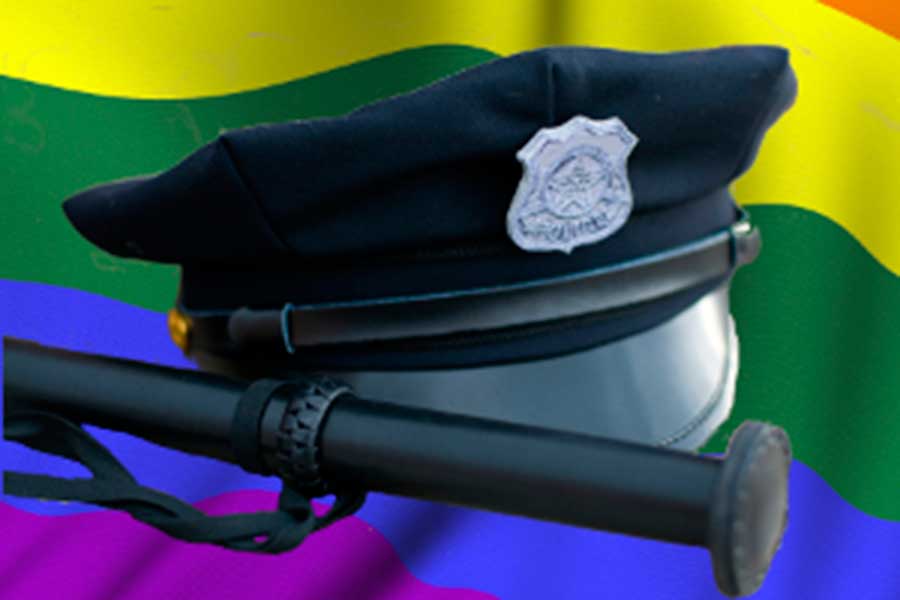Advocates for Officer Claudia D. Carr say anti-LGBT bias within the Cherry Hill, N.J., police department contributed to her termination, but they’re hoping she’ll be able to receive a pension.
Carr, 56, has a wife and a teenage daughter, and she’s counting on her pension to help her support them, advocates say.
According to an antibias complaint filed in New Jersey Superior Court, Carr was suspended in June 2014 for allegedly being unfit for duty. She allegedly threatened a coworker, though Carr denies doing so. The accusation that Carr threatened a coworker allegedly was an excuse to dismiss Carr because she came out as a lesbian, the complaint states.
In October 2014, Carr was terminated, and the following month she was officially charged with unfitness for duty and insubordination.
Carr’s paychecks resumed in April 2015 because the dispute ensued for more than 180 days. She’s challenging her termination. But if it’s upheld, she’ll have to return the money.
Her annual salary is about $94,000, according to public records.
Carr’s attorney Stuart J. Alterman was asked if his client would like to resolve the matter.
“Absolutely,” Alterman replied. “She would love to resolve the case by getting a decent pension that she earned by working for the past 18-plus years as a police officer, protecting the citizens of Cherry Hill. If both sides show good faith, I’m optimistic that can happen forthwith.”
Alterman said a resolution of the matter wouldn’t cost the township additional funds.
“We’re not asking the town to spend more money,” he continued. “We’re just asking the town to allow Claudia to apply for something she’s already paid into and entitled to receive. But in order for her to apply, she must be an employee in good standing. We don’t see any reason why that can’t happen.”
A Change.org petition circulated on behalf of Carr had 267 signatures as of presstime.
Christine P. O’Hearn, an attorney for the township issued this statement about the matter:
“The allegations of discrimination against Ms. Carr because of her sexuality lack merit. the township’s decision to terminate Ms. Carr because she was unfit for duty and for insubordination had been upheld by Francis J. Orlando, J.S.C. (retired) after a hearing. Judge Orlando found that ‘the township has proved Officer Carr is not fit for duty…[and]…Inasmuch as Officer Carr cannot perform the duties required of a police officer, termination is mandated.’ Judge Orlando also found that Carr’s insubordination was ‘flagrant … [and] demonstrates she is unfit to be a police officer.’ While Carr has filed an appeal of Judge Orlando’s decision, we are confident that the decision will be affirmed.
“Further, any allegation that the township has done or failed to do anything that would prevent Ms. Carr from applying for a disability or ordinary pension is false. Ms. Carr can apply for a pension benefit at any time. She has simply failed to do so.”
Jay Lassiter, an LGBT advocate and resident of Cherry Hill, stopped short of accusing the township of anti-LGBT bias. But he expressed concern about Carr’s termination.
“It’s important for LGBT residents in Cherry Hill to know the mayor and Cherry Hill Police Department have our back,” Lassiter said. “The firing of one of the few gay members of the force feels a bit personal to the community. There are two sides to every story and I hope this gets sorted out quickly for the sake of Claudia and her family.”
Lassiter noted that Cherry Hill Mayor Chuck Cahn has presided over same-sex marriages.
“Our mayor isn’t antigay. He’s married plenty of gay couples since marriage equality kicked in here. And no one’s expecting Mayor Cahn to comment about sensitive personnel or legal issues,” Lassiter said. “But given how this looks — a lesbian cop gets fired after coming out just shy of retirement — Mayor Cahn surely understands how this situation might be perceived by gay people as a violation of fair play. I look forward to the mayor addressing this situation in general terms, promptly.”
Lassiter said improved communication with township officials can benefit the community.
“Everyone sleeps better at night knowing the Cherry Hill Police Department is protecting us. So it’s important that minority communities work closely with local police to cement ties. There’s not much of that happening right now and maybe that’s something positive we might take from this situation: a commitment to cultivate a better relationship between Cherry Hill police and the residents they protect, who happen to be gay.”
Bridget Palmer, a spokesperson for Cahn, declined to comment for this story.

